Related Research Articles

AC/DC are an Australian rock band formed in 1973. It was founded by brothers Malcolm Young on rhythm guitar and Angus Young on lead guitar. Their current line-up comprises Angus, bass guitarist Cliff Williams, drummer Phil Rudd, lead vocalist Brian Johnson and rhythm guitarist Stevie Young, nephew of Angus and Malcolm. Their music has been variously described as hard rock, blues rock and heavy metal, but the band calls it simply "rock and roll". They are cited as a formative influence on the new wave of British heavy metal bands, such as Def Leppard and Saxon. AC/DC were inducted into the Rock and Roll Hall of Fame in 2003.

Rose Tattoo are an Australian rock and roll band, now led by Angry Anderson, which formed in Sydney in 1976. Their sound is hard rock mixed with blues rock influences, with songs including "Bad Boy for Love", "Rock 'n' Roll Outlaw", "Nice Boys", "We Can't Be Beaten" and "Scarred for Life". Their first four albums were produced by Harry Vanda and George Young who also worked with AC/DC. They disbanded in 1987, subsequently reforming briefly in 1993 to support Guns N' Roses on an Australian tour. They reassembled again from 1998 and have since released two more studio albums.
Flick of the Switch is the ninth studio album by Australian hard rock band AC/DC. The album was deemed a commercial disappointment after it failed to match the sales figures of the band's two previous releases, 1980's Back in Black and 1981's For Those About to Rock, and its release represented the beginning of the band's commercial decline. The third AC/DC album to feature lead vocalist Brian Johnson, the album is also the last to feature drummer Phil Rudd before his return on Ballbreaker (1995). The album was re-released in 2003 as part of the AC/DC Remasters series.
Mortification is an Australian Christian death metal band which was formed in 1987 as a heavy metal group, Lightforce, by mainstay Steve Rowe on bass guitar and vocals. By 1990, in the Melbourne suburb of Moorabbin, they were renamed as Mortification with the line-up of Rowe, Michael Carlisle on guitar and Jayson Sherlock on drums. Mortification has released fourteen studio albums, three compilation albums, three extended plays, six live discs, one demo album, one box set, and several videos on major record labels such as Nuclear Blast. As one of the earliest internationally successful Christian death metal bands from Australia, they served as an inspiration for later similar groups.

Krokus is a Swiss hard rock and heavy metal band formed in 1975. They were popular in North America during the 1980s. The band was founded in Solothurn in 1975 by Chris von Rohr and Tommy Kiefer (guitar), both former members of Kaktus. Former TEA vocalist Marc Storace joined the band as frontman in time for their Metal Rendez-vous album in 1980.

Phillip Hugh Norman Rudd is an Australian drummer, best known as the drummer of AC/DC across three stints. On the 1977 departure of bass guitarist Mark Evans from AC/DC, Rudd became the only Australian-born member of the band. In 2003, he entered the Rock and Roll Hall of Fame along with the other members of AC/DC. In 2014, Rudd released his first solo album, Head Job. Due to ongoing legal problems in New Zealand, where he is a resident, Rudd was unable to join the band for the 2015 Rock or Bust World Tour and was replaced by Chris Slade. On 30 September 2020, AC/DC confirmed that Rudd would be rejoining the band for their comeback album Power Up.

The Razors Edge is the twelfth studio album by Australian rock band AC/DC. Released on 24 September 1990, through Albert Productions/CBS Records International in Australasia and Atlantic Records in Europe, it was recorded in 1990 in Little Mountain Sound Studios in Vancouver, Canada, and was mixed and engineered by Mike Fraser and produced by Bruce Fairbairn. It was a major comeback for the band, featuring the hits "Thunderstruck", "Are You Ready" and "Moneytalks". This is the only studio album to feature Welsh drummer Chris Slade, who was the drummer for AC/DC from 1989 to his dismissal in 1994.
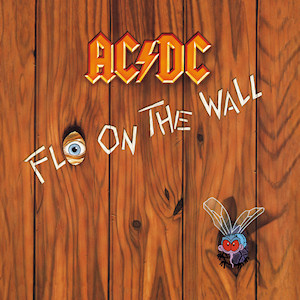
Fly on the Wall is the tenth studio album by Australian hard rock band AC/DC, released on 1 July 1985 by Albert Productions, and Atlantic Records. The album was re-released in 2003 as part of the AC/DC Remasters series.
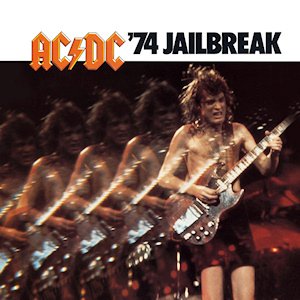
'74 Jailbreak is the only EP by Australian rock band AC/DC, released in 1984. It is composed of five tracks that had previously been released only in Australia. Despite the EP's title, the song "Jailbreak" was actually recorded in 1976 and was originally released that year on the Australian version of the Dirty Deeds Done Dirt Cheap album. The EP's four other tracks were originally released on the Australian version of the band's debut album, High Voltage, recorded in 1974 and released early the following year.

Clifford Williams is an English musician, best known as the bassist and backing vocalist of the Australian hard rock band AC/DC. He started his professional music career in 1967 and had previously been in the English groups Home and Bandit. His first studio album with AC/DC was Powerage in 1978. Williams was inducted into the American Rock and Roll Hall of Fame as a member of AC/DC in 2003. Williams announced his retirement from AC/DC in 2016, but returned for their 2020 comeback album Power Up along with band mates Brian Johnson and Phil Rudd. His side projects include benefit concerts.
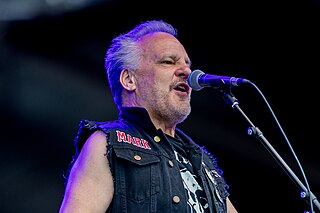
Mark Whitmore Evans is an Australian musician, the current bass guitarist for rock band Rose Tattoo, and also a member of hard rock band AC/DC from March 1975 to June 1977. His playing featured on their albums T.N.T, High Voltage, Dirty Deeds Done Dirt Cheap and Let There Be Rock. Evans has played for numerous other groups, sometimes on lead guitar, including Finch, Cheetah, Swanee, Heaven and The Party Boys. Evans' autobiography, Dirty Deeds: My Life Inside/Outside of AC/DC was released in December 2011.
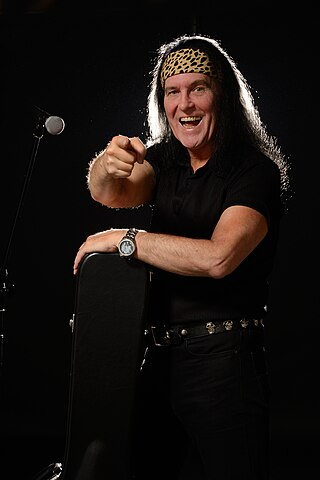
Dave Evans is an Australian singer. He was the original lead singer for the Australian hard rock band AC/DC in 1973–1974 and sang on their debut single shortly before being replaced by Bon Scott. Evans then went on to join the band Rabbit who were active into the early 1980s. He resumed a solo career shortly after the year 2000.

Larry Van Kriedt is an American-born Australian jazz musician. He is best known for being the original bassist for the rock band AC/DC around November 1973, joining Malcolm Young, Angus Young, Dave Evans and Colin Burgess (drums). He was replaced in February 1974. Van Kriedt also plays saxophone, guitar and sings.

"It's a Long Way to the Top (If You Wanna Rock 'n' Roll)" is a song by Australian hard rock band AC/DC. It is the first track of the group's second album T.N.T., released only in Australia and New Zealand on 8 December 1975, and was written by Angus Young, Malcolm Young and Bon Scott. The song combines bagpipes with hard rock instrumentation; in the middle section of the song there is a call and response between the bagpipes and guitar. The original recording is in B-flat major, but it was played live in A major.

Colin John Burgess was an Australian rock musician who was the drummer in the Masters Apprentices from 1968 to 1972. He was later the original drummer with hard rock band AC/DC from November 1973 to February 1974. The Masters Apprentices had top 20 singles chart success with "5:10 Man", "Think about Tomorrow Today", "Turn Up Your Radio" and "Because I Love You".
Rob Bailey is an Australian musician who was an early bassist with the hard rock band AC/DC. He joined the group in April 1974, with Malcolm Young, Angus Young, Dave Evans and Peter Clack (drums). Bailey left in January 1975.
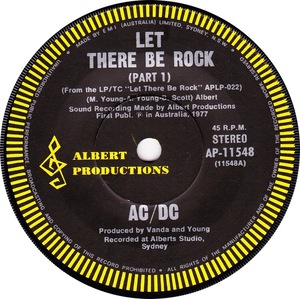
"Let There Be Rock" is a song by Australian hard rock band AC/DC. It is the third and title track of their album Let There Be Rock, released in March 1977, and was written by Angus Young, Malcolm Young, and Bon Scott.

"Can I Sit Next to You, Girl" is the debut single by Australian hard rock band AC/DC, issued on 22 July 1974. On 26 August 1974, the song peaked at number 50 in Australia. This version has lead vocals performed by Dave Evans prior to his being replaced by Bon Scott, as well as drums by ex-Masters Apprentices member Colin Burgess, and bass guitar by ex-The Easybeats member George Young. Originally, AC/DC's first bassist, Larry Van Kriedt, played the bass parts, but George recorded his own over them later. In 1975, after Scott joined, the group re-arranged and re-recorded the song as the seventh track on their Australia-only album T.N.T., released in December 1975, and as the sixth track on the international version of High Voltage, released in May 1976. The title of this version of the song removed the comma, becoming "Can I Sit Next To You Girl".

High Voltage is the debut studio album by Australian hard rock band AC/DC, released only in Australia and New Zealand, on 17 February 1975. Their first international release in 1976 would also be named High Voltage, though with a radically different track list.
References
- 1 2 McFarlane, Ian (1999). "Encyclopedia entry for 'AC/DC'". Encyclopedia of Australian Rock and Pop . St Leonards, NSW: Allen & Unwin. ISBN 1-86508-072-1. Archived from the original on 6 August 2004. Retrieved 26 February 2012.
- ↑ "Raw Sylke". Triple J Unearthed . Retrieved 12 November 2011.
- Two Sides to Every Glory, Paul Stenning, 2005
- "Metal Hammer & Classic Rock present AC/DC", Metal Hammer magazine special, 2005